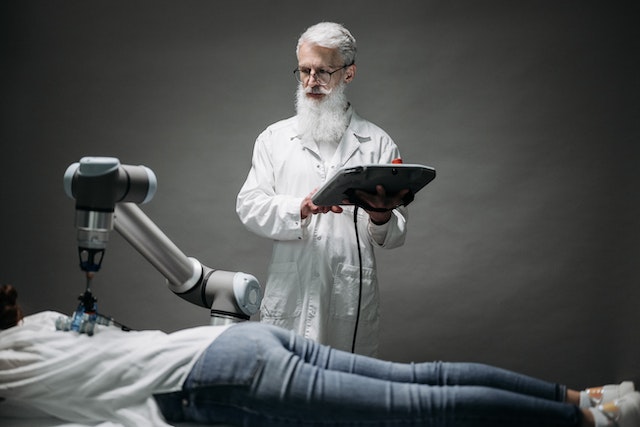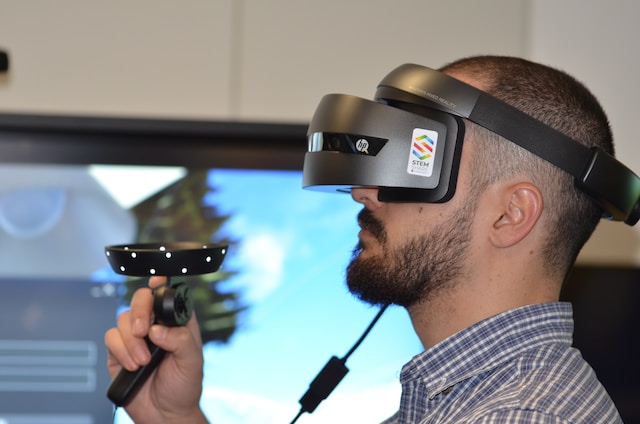
In the age of technological advancements, one concept stands out as both revolutionary and transformative: artificial intelligence (AI). With its cutting-edge algorithms and computational power, AI has rapidly transcended the realm of science fiction and steadily integrated itself into various aspects of our lives. From healthcare to finance, transportation to entertainment, AI has proven its potential to revolutionize these fields through its ability to analyze immense amounts of data and make intelligent decisions. In this article, we delve into the captivating world of AI and explore its vast applications across different industries, highlighting the importance it holds in shaping our future.
AI in Healthcare
One of the most promising and impactful applications of AI lies in the field of healthcare. With the ability to analyze complex medical data, identify patterns, and predict outcomes, AI has the potential to transform the way we approach diagnosis, treatment, and patient care. Let’s explore some of the key areas where AI is making a significant impact in healthcare:
Diagnosis and Imaging:
AI-powered algorithms are enabling physicians and radiologists to detect and diagnose diseases with greater accuracy and efficiency. Machine learning models can analyze vast amounts of medical images, such as X-rays, MRIs, and CT scans, to identify early signs of diseases like cancer, strokes, and heart conditions. This not only saves valuable time but also assists medical professionals in making better-informed decisions.
Personalized Medicine:
AI algorithms can analyze patients’ genetic information, medical history, and lifestyle data to predict individualized treatment strategies. This enables physicians to tailor medical interventions to the specific needs of each patient, ensuring more effective and personalized healthcare. Additionally, AI-powered decision support systems can help doctors identify potential drug interactions and allergies, minimizing the risk of adverse reactions.
Virtual Assistants and Chatbots:
AI-driven virtual assistants and chatbots have transformed the way patients interact with healthcare providers. These advanced systems can provide instant access to information, offer basic medical advice, and even assist in scheduling appointments and medication reminders. Virtual assistants also play a vital role in mental health care, providing support and counseling to those in need.
Predictive Analytics and Disease Management:
AI algorithms can analyze vast amounts of patient data, including electronic health records, medical literature, and research studies, to predict disease outbreaks and identify individuals at high risk. This knowledge can help healthcare organizations allocate resources, implement preventive measures, and develop targeted interventions for improved disease management.
Applications of AI in Business and Finance
In the fast-paced world of business and finance, AI holds great promise in revolutionizing traditional practices, driving efficiency, and fostering innovation. Let’s explore some of the ways AI is transforming these industries:

Predictive Analytics:
AI algorithms can analyze vast amounts of financial data, market trends, and customer behavior to make accurate predictions about future market conditions. This enables businesses to optimize their strategies, make informed investment decisions, and mitigate risks effectively.
Fraud Detection:
AI-powered systems can detect patterns and anomalies in financial transactions, flagging potential instances of fraud. By continuously analyzing data and adapting to new patterns, these systems provide an extra layer of security, protecting businesses and customers alike.
Algorithmic Trading:
AI algorithms have revolutionized the world of trading by automating the process and enabling faster and more efficient decision-making. By analyzing market data and reacting to changes in real-time, AI trading systems can execute trades with precision, minimizing human error, and maximizing profitability.
Customer Service:
AI-driven chatbots and virtual assistants are transforming customer service experiences across various industries. With natural language processing capabilities, these systems can engage with customers, answer queries, and provide personalized recommendations, enhancing customer satisfaction and driving business growth.
Risk Management:
Through sophisticated data analysis, AI algorithms can assess and predict potential risks in business operations and financial markets. These advanced risk management systems enable businesses to proactively address risks, develop contingency plans, and protect their assets.
Personalized Marketing:
AI-powered analytics can analyze customer behavior and preferences to deliver personalized marketing campaigns. By understanding customer needs and tailoring offerings, businesses can improve customer engagement, increase conversion rates, and foster long-term loyalty.
AI in Transportation and Autonomous Systems
The world of transportation has undergone a dramatic transformation with the advent of artificial intelligence. From improving road safety to optimizing traffic flow, applications of AI have the potential to revolutionize the way we travel. Let’s explore some of the key applications of AI in transportation and the development of autonomous systems:
- Enhanced Safety: AI-powered systems are paving the way for safer roads by analyzing vast amounts of data from sensors, cameras, and other sources to detect potential hazards in real-time. These intelligent systems can identify objects, pedestrians, and even predict the behavior of other vehicles, helping to prevent accidents and save lives.
- Autonomous Vehicles: Perhaps the most talked-about application of AI in transportation, autonomous vehicles have the potential to redefine the way we commute. With advanced sensors, machine learning algorithms, and sophisticated decision-making capabilities, these driverless cars can navigate complex traffic scenarios, making transportation more efficient and eliminating the human error factor.
- Traffic Optimization: AI algorithms can analyze real-time traffic data, including historical patterns and external factors such as weather conditions or events, to optimize traffic flow. By dynamically adjusting traffic signal timings, rerouting vehicles, and suggesting alternate routes, AI can reduce congestion, minimize travel time, and improve overall transportation efficiency.
- Smart Infrastructure: AI can enable the development of smart transportation infrastructure, where sensors and cameras collect real-time data, and intelligent algorithms analyze and respond to it. This integration allows for adaptive traffic management, efficient parking systems, and effective public transportation networks, making cities more sustainable and people-friendly.
- Predictive Maintenance: AI algorithms can analyze data from sensors within vehicles or transportation systems to predict maintenance needs and prevent potential breakdowns. By identifying patterns of wear and tear, these systems can alert maintenance crews before any major failures occur, reducing downtime and improving overall reliability.
- Logistics and Supply Chain Optimization: AI algorithms can optimize supply chain management by predicting demand patterns, identifying the most efficient routes for deliveries, and optimizing inventory levels. This helps businesses streamline their operations, reduce costs, and improve customer satisfaction.
- Personalized Travel Experience: AI-powered travel assistants can provide personalized recommendations and assistance to travelers. By analyzing preferences, behavior patterns, and external factors, these virtual assistants can suggest tailored itineraries, provide real-time updates and alerts, and enhance the overall travel experience.
Applications of AI in Education
Education is an essential aspect of human development, and artificial intelligence has the potential to revolutionize the way we teach and learn. With its ability to process vast amounts of data and adapt to individual needs, applications of AI can personalize education, enhance student engagement, and optimize educational practices. Let’s explore some of the ways AI is transforming education:

Personalized Learning:
AI algorithms can analyze student data, including learning styles, strengths, and weaknesses, to create personalized learning experiences. By adapting the curriculum and pacing to individual students, AI-powered educational platforms can ensure that each learner receives tailored instruction, leading to improved academic outcomes.
Intelligent Tutoring:
AI-powered virtual tutors can provide personalized guidance and support to students, supplementing traditional teaching methods. These virtual assistants can adapt their instruction based on the student’s progress and provide real-time feedback, enhancing comprehension and mastery of concepts.
Automated Grading:
With AI, grading can become less time-consuming for educators. Machine learning algorithms can analyze and evaluate student assignments, providing instant feedback and freeing up teachers’ time for other essential tasks. This automation not only facilitates faster grading but also ensures consistent and unbiased evaluation.
Smart Content Creation:
AI can facilitate the development of interactive and engaging educational content. Intelligent tools can analyze existing resources, such as textbooks and articles, and generate summaries, quizzes, and visual aids to supplement classroom instruction. This enables teachers to focus more on personalized interactions with students and fosters active learning.
Data-Driven Decision Making:
AI systems can analyze large-scale educational data, including student performance, attendance, and engagement, to identify patterns and make informed decisions. By leveraging this data, educators can better understand student needs, predict academic outcomes, and implement targeted interventions for improved learning.
AI in Manufacturing and Robotics
The advent of artificial intelligence has ushered in a new era in the field of manufacturing and robotics.

With its ability to analyze vast amounts of data, optimize processes, and perform complex tasks, applications of AI are revolutionizing the way products are designed, manufactured, and assembled. Let’s delve into some of the key applications of AI in manufacturing and robotics:
- Intelligent Automation: AI-powered robots and machines are capable of performing intricate tasks with precision and efficiency. From assembly line operations to quality control inspections, these smart machines can analyze data in real-time, make informed decisions, and adapt to changing conditions. This not only improves productivity but also enhances product quality and reduces errors.
- Predictive Maintenance: AI algorithms can analyze sensor data and historical maintenance records to predict potential equipment failures and schedule maintenance proactively. By identifying maintenance needs before issues arise, manufacturers can minimize downtime, optimize maintenance costs, and ensure uninterrupted production.
- Supply Chain Optimization: AI-powered algorithms can analyze supply chain data, including inventory levels, demand patterns, and supplier performance, to optimize inventory management, streamline logistics, and enhance overall efficiency. This enables manufacturers to reduce costs, improve customer satisfaction, and respond to market demands more effectively.
- Quality Control: AI systems can analyze real-time data from sensors and cameras to detect defects and anomalies during the manufacturing process. By leveraging computer vision and machine learning, manufacturers can identify deviations from quality standards, make adjustments in real-time, and ensure that only flawless products reach the market.
- Collaborative Robots (Cobots): AI-enabled collaborative robots are designed to work alongside human operators, assisting them in performing tasks that require strength, precision, or speed. These cobots can analyze human movement, adapt to their actions, and provide support, enhancing safety, productivity, and overall efficiency in the workplace.
- Product Design and Optimization: AI algorithms can analyze consumer data, market trends, and competitor analysis to generate insights that inform product design and optimization. By understanding customer preferences and demands, manufacturers can create products that better align with consumer needs, resulting in improved market penetration and customer satisfaction.
AI in Entertainment and Gaming
In the world of entertainment and gaming, one industry has truly embraced the power of artificial intelligence: the entertainment industry itself.

Applications of AI have revolutionized the way we consume and interact with media, creating immersive experiences that captivate audiences like never before.
Thanks to AI algorithms, streaming services like Netflix and Spotify are able to offer personalized recommendations based on our viewing and listening habits. By analyzing our preferences, AI can suggest movies, TV shows, and songs that align with our tastes, ensuring that we never run out of entertainment options.
Moreover, AI has transformed the gaming industry by enhancing both gameplay and graphics. With the ability to process vast amounts of data in real-time, AI algorithms can create dynamic and responsive environments that adapt to players’ actions. This allows for more engaging and challenging gameplay that keeps players on the edge of their seats.
AI is also employed in developing realistic graphics and animation. By analyzing human movements and expressions, AI algorithms can generate lifelike characters and stunning visual effects that blur the line between reality and the virtual world.
Virtual reality (VR) and augmented reality (AR) technologies have also benefited greatly from AI. AI algorithms work behind the scenes to create immersive VR experiences and overlay digital elements onto the real world in AR applications. This enables users to explore virtual landscapes, interact with virtual objects, and immerse themselves in new and exciting realities.
In addition to enhancing entertainment experiences, AI has also found its place in the creation process itself. AI algorithms can generate original music, artwork, and even movie scripts, pushing the boundaries of creativity. By analyzing existing works and patterns, AI can replicate and innovate, offering new perspectives and ideas to artists and creators.
In conclusion, artificial intelligence has emerged as a powerful force that is reshaping industries and redefining what is possible. By embracing AI’s potential and leveraging its capabilities, we can unlock new frontiers and pave the way for a brighter, more connected future. The possibilities are endless, and it is up to us to harness this transformative technology for the benefit of all.
